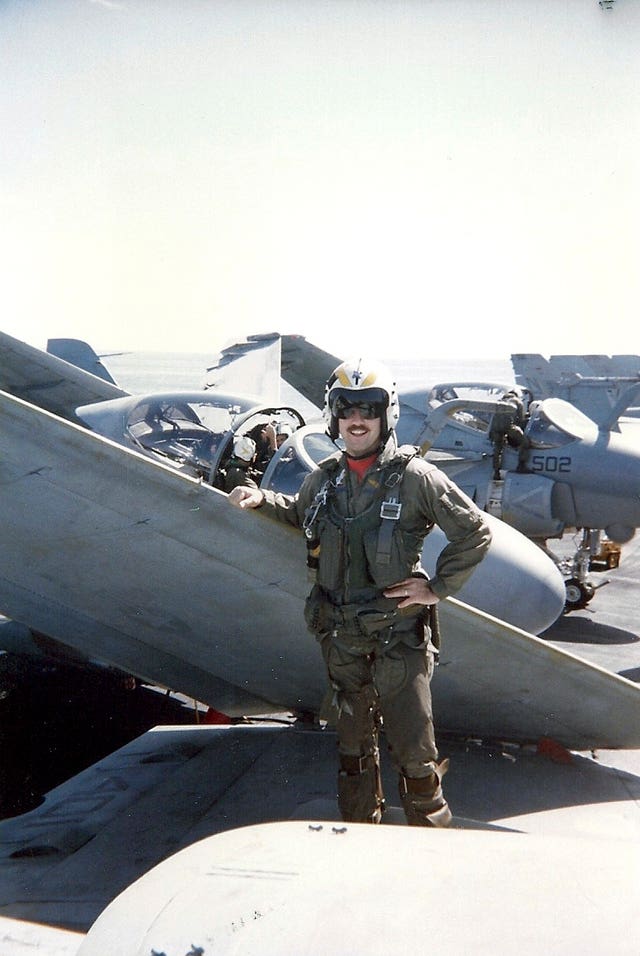
A Pentagon study has found high rates of cancer among military pilots and the ground crews who fuel, maintain and launch their aircraft.
The data had long been sought by retired military aviators who have raised alarms for years about the number of air and ground crew members they knew who had cancer.
They were told that earlier military studies had found they were not at greater risk than the general US population.
In its year-long study of almost 900,000 service members who flew on or worked on military aircraft between 1992 and 2017, the Pentagon found that air crew members had an 87% higher rate of melanoma and a 39% higher rate of thyroid cancer, while men had a 16% higher rate of prostate cancer and women a 16% higher rate of breast cancer.
Overall, the air crews had a 24% higher rate of cancer of all types.
The study showed ground crews had a 19% higher rate of brain and nervous system cancers, a 15% higher rate of thyroid cancer and a 9% higher rate of kidney or renal cancers, while women had a 7% higher rate of breast cancer. The overall rate for cancers of all types was 3% higher.
There was some good news reported as well. Both ground and air crews had far lower rates of lung cancer, and air crews also had lower rates of bladder and colon cancers.
The data compared the service members with the general US population after adjusting for age, sex and race.

The Pentagon said the new study was one of the largest and most comprehensive to date. An earlier study had looked at just Air Force pilots and had found some higher rates of cancer, while this one looked across all services and at both air and ground crews.
Even with the wider approach, the Pentagon cautioned that the actual number of cancer cases was likely to be even higher because of gaps in the data, which it said it would work to remedy.
The study “proves that it’s well past time for leaders and policy makers to move from scepticism to belief and active assistance”, said retired Air Force colonel Vince Alcazar, a member of the Red River Valley Fighter Pilots Association, which had lobbied the Pentagon and Congress for help.
Mr Alcazar serves on the association’s medical issues committee.
The study was required by Congress in the 2021 defence bill. Now, because higher rates were found, the Pentagon must conduct an even bigger review to try to understand why the crews are getting sick.
Isolating potential causes is difficult, and the Pentagon was careful to note that this study “does not imply that military service in air crew or ground crew occupations causes cancer, because there are multiple potential confounding factors that could not be controlled for in this analysis,” such as family histories, smoking or alcohol use.
But aviation crews have long asked for the Pentagon to look closely at some of the environmental factors they are exposed to, such as jet fuels and solvents used to clean and maintain jet parts, sensors and their power sources in aircraft nose cones, and the massive radar systems on the decks of the ships they land on.
The study found that when crew members were diagnosed with cancer, they were more likely to survive than members of the general population, which the study suggested was because they were diagnosed earlier due to regular required medical check-ups and were more likely to be in better health because of their military fitness requirements.
The Pentagon acknowledged that the study had gaps that likely led to an undercount of cancer cases.
Betty Seaman’s husband, Jim, a former Navy pilot, died of lung cancer aged 61 in 2018.
She said his clothes and equipment always reeked of aviation fuel.
Mrs Seaman and others wonder if there’s a link. She said crews would talk about how even the ship’s water systems would smell of fuel.


Why are you making commenting on The National only available to subscribers?
We know there are thousands of National readers who want to debate, argue and go back and forth in the comments section of our stories. We’ve got the most informed readers in Scotland, asking each other the big questions about the future of our country.
Unfortunately, though, these important debates are being spoiled by a vocal minority of trolls who aren’t really interested in the issues, try to derail the conversations, register under fake names, and post vile abuse.
So that’s why we’ve decided to make the ability to comment only available to our paying subscribers. That way, all the trolls who post abuse on our website will have to pay if they want to join the debate – and risk a permanent ban from the account that they subscribe with.
The conversation will go back to what it should be about – people who care passionately about the issues, but disagree constructively on what we should do about them. Let’s get that debate started!
Callum Baird, Editor of The National
Comments: Our rules
We want our comments to be a lively and valuable part of our community - a place where readers can debate and engage with the most important local issues. The ability to comment on our stories is a privilege, not a right, however, and that privilege may be withdrawn if it is abused or misused.
Please report any comments that break our rules.
Read the rules here